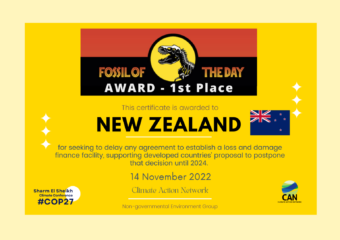Responding to the final communiqué of the COP27 climate talks in Sharm El-Sheikh, Gabriela Bucher, Oxfam International’s Executive Director, said:
“The establishment of a loss and damage fund is a monumental achievement for vulnerable developing countries and communities at the frontlines of the climate crisis. They have been calling for funding to cope with the devastating impacts of climate change for over 30 years.
“Given the urgency on the ground, the fund must be operationalised as soon as possible. Rich countries largely responsible for warming our planet should immediately mobilise substantial new and additional resources to pay for climate-related damage in vulnerable countries.
“In East Africa, nearly 40 million people are experiencing climate-induced hunger. Recent catastrophic floods in Pakistan have inflicted more than US$30 billion in damages and economic losses and left 10 to 12 percent of the country’s land area under water, affecting more than 33 million people. The list of extreme weather events and disasters is growing, as are the devastating impacts on communities.
“While we applaud the establishment of the loss and damage fund, we remain deeply concerned about countries’ failure to agree on an equitable and urgent phase-out of all fossil fuels. The world is on track for a catastrophic 2.8°C of warming.
“Rich countries, especially the US and those in the EU, have failed to use their power and resources to meet their fair share of responsibility and their moral and legal obligations. Rich countries and many middle-income countries that have the ability to do so are not transitioning away from fossil fuels fast enough to keep warming below 1.5°C, leading to more losses, damages and suffering. Rich countries are not providing the necessary finance to support developing countries to leapfrog to renewable energy.
“Rich countries have broken their US$100 billion climate finance promise and successfully blocked language at COP27 that would have required them to compensate for earlier shortfalls through increased climate finance in subsequent years. Climate finance is needed in the trillions for adaptation and mitigation. Given their responsibility for the climate crisis, rich countries at least could have provided a clear roadmap on how to deliver the US$600 billion they had promised between 2020 and 2025.
“We are also dismayed by the discussions to enhance the Gender Action Plan, which was at the heart of the UNFCCC processes for gender-responsive climate action. Gender was only marginally mentioned, if at all, in the climate talks’ decisions.
“The climate crisis is about inequality and injustice. Communities at the frontlines of the climate crisis are bearing the heaviest brunt of climate-induced disasters, in addition to multiple crises including conflict, loss of livelihoods, and economic shocks. World leaders must push political differences aside and put the needs of these communities first.”






